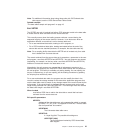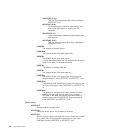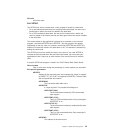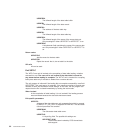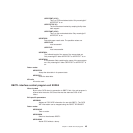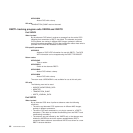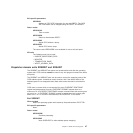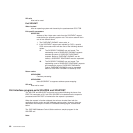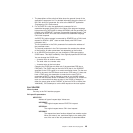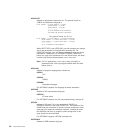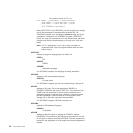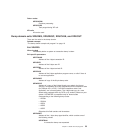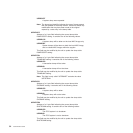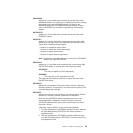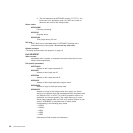1. The descriptions of the exits that follow show the general format of the
application’s parameter list. For detailed information about the format of
the CALL-level DL/I parameter list, refer to the IMS/ESA
®
Application
Programming: DL/I Calls manual.
2. For all EXEC DLI calls, the application’s parameter list is in
assembler-language format (that is, the value of the program language
byte pointed to by UEPLANG is always UEPASM, and the parameter list
pointed to by UEPAPLIST is always in assembler-language format). This
is because all EXEC DLI calls are converted into assembler-language
CALL-level requests.
An EXEC DLI online request is converted by DFHEDP into a CALL-level
request for DFHDLI. (IMS
™
does not deal directly with EXEC-level
parameter lists.)
The first parameter in the CALL parameter list contains the address of
the parameter count.
The second parameter in the CALL parameter list contains the address
of the function. All other parameters are dependent on the function.
3. In an XDLIPRE exit program you can change the PSB name and the
SYSID name. This helps availability if the originally specified SYSID fails.
You can change the SYSID from:
v A remote value to another remote value
v The local value to a remote value
v A remote value to the local value.
Changing the SYSID has an effect only if the associated PSB has a
PDIR entry. The SYSID may be the local CICS (that is, the SYSIDNT
specified on the CICS region) or a remote connection name. For the new
SYSID to be used, the PSB name must have a PDIR entry; if it does not
have a PDIR entry, the assumption is made that the local CICS is
connected to DBCTL, and an attempt is made to run the IMS request
there. An IMS schedule failure is handled in the same way as a failure to
route to a connection that does not exist. If the SYSID is changed to
either the same value as the SYSIDNT of the local CICS or blanks (hex
'40404040'), CICS attempts to run the IMS request on the local system.
Exit XDLIPRE
When invoked
On entry to the DL/I interface program.
Exit-specific parameters
UEPCTYPE
Address of type-of-request byte. Values are:
UEPCEXEC
The original request was an EXEC DLI request.
UEPCCALL
The original request was a CALL-level request.
UEPCSHIP
The request has been function shipped from another region.
When this value is set, restrictions apply to the setting and
use of the rest of the exit parameters, as described below.
Chapter 1. Global user exit programs 49



